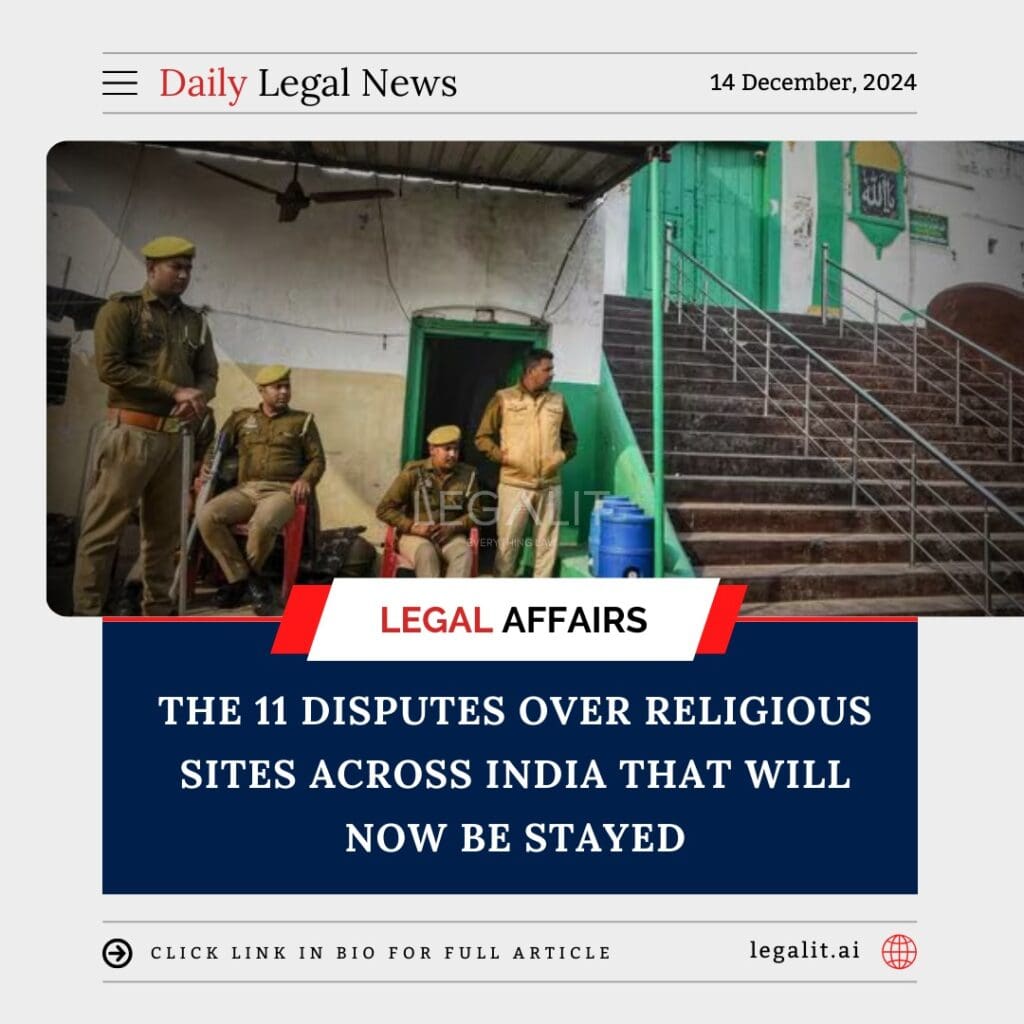
The Supreme Court of India has ordered a stay on 11 ongoing disputes regarding religious sites across the country. The cases, which involve conflicts between different religious groups over the ownership and control of religious spaces, have attracted significant attention due to their potential to exacerbate communal tensions. The Supreme Court’s order aims to pause these proceedings until a comprehensive legal framework can be established to address such sensitive matters.
Background:
The 11 disputes under review involve contentious religious sites where historical, cultural, and political factors have contributed to deep divisions between communities. These disputes often stem from competing claims over land and the right to manage religious sites, which are of significant cultural and spiritual importance. Some of these cases are linked to high-profile locations, with ongoing legal battles regarding the status and governance of such sites.
In one instance, the dispute involves a temple that shares space with a mosque, while in another, a Christian church is at the center of contention with local Hindu groups. Other cases include disputes involving Sikh gurdwaras and Buddhist monuments, where multiple religious communities lay claim to the sites based on historical or spiritual grounds. The complexity of these issues has made legal resolution challenging, with the potential for communal violence and unrest escalating in sensitive areas.
The Supreme Court’s decision to stay these disputes comes in light of the need for a uniform approach that would prevent further escalation and violence. The Court highlighted the necessity of carefully balancing the rights of all religious communities while ensuring peace and order.
Court’s Rationale:
The Supreme Court’s ruling to stay these disputes reflects its recognition of the volatile nature of religious site disputes in India. The Court observed that ongoing litigation could inflame tensions, particularly in regions where the socio-political environment is already strained. The stay order is intended to buy time for the formulation of a more structured approach to handling such disputes, which might include mediation, government intervention, or a new legal framework.
The Court also pointed out that religious sites should not become battlegrounds for political or ideological conflicts. It emphasized that the preservation of communal harmony is paramount, and thus, it is crucial to approach these disputes with utmost sensitivity. The stay will allow the parties involved to come together and seek an amicable resolution, reducing the likelihood of further legal confrontations.
Existing Measures:
In India, disputes over religious sites have been a long-standing issue, often linked to historical events and religious sensitivities. The government has previously intervened in several high-profile cases, either through negotiations or by enforcing status quo orders. However, there has been no uniform approach to resolving such conflicts, leading to prolonged legal battles and occasional violence.
The judiciary has occasionally issued directions to maintain peace and avoid any changes to the status of disputed sites during the pendency of cases. However, there has been a need for a more cohesive strategy that addresses both legal and communal concerns in a comprehensive manner. The Supreme Court’s intervention highlights the growing recognition of the need for a legal framework that can handle religious disputes in a balanced and transparent way.
Conclusion:
The Supreme Court’s decision to stay 11 religious site disputes marks a significant step toward ensuring that sensitive matters do not escalate into broader communal conflicts. By pausing these cases, the Court aims to create an opportunity for a more structured and peaceful resolution, safeguarding the interests of all religious communities involved. Moving forward, it is likely that the government, in collaboration with religious leaders and legal experts, will develop a framework that can address such disputes in a manner that promotes social harmony and respects religious diversity.